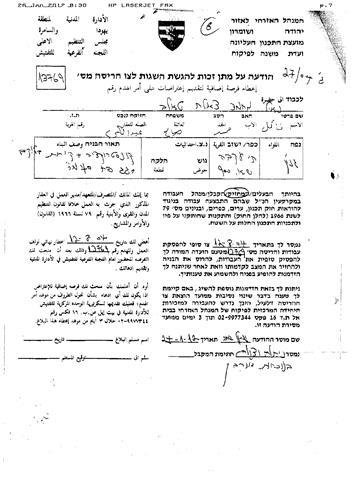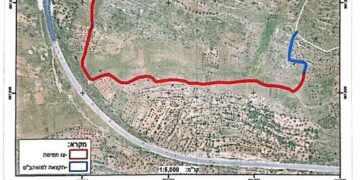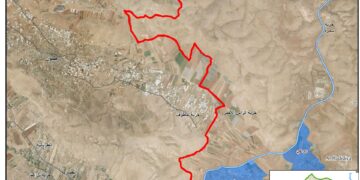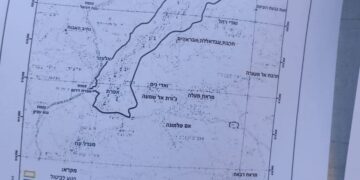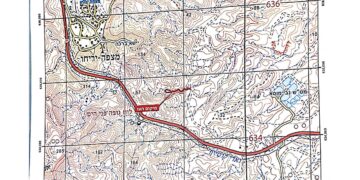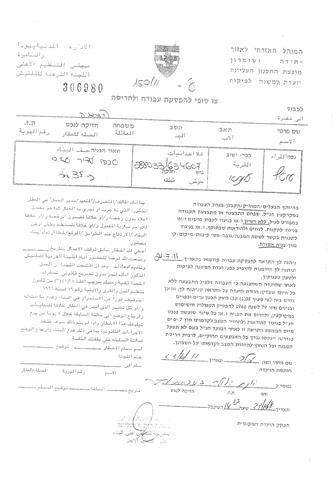On January 24, 2012, the Israeli Sub-Committee for Inspection affiliated to the Israeli Civil administration delivered 17 military orders to Palestinian residents in Al Aqaba village, in Tubas governorate, in the Jordan Valley. Ten of these military orders were Halt of Construction orders while the remaining orders were to give grace period to submit objection to the demolition orders that were issued previously in the village, under the pretext of lacking proper building licenses. Table 1 gives details of the targeted properties:
|
Table 01: List of the targeted Properties in Al Aqaba village – Tubas governorate, in the Jordan Valley
|
|
No.
|
Owner
|
Members
|
Alerted properties
|
Notes
|
|
1.
|
Dyfallah Zawahra
|
10
|
Residential & Agricultural barracks
|
First time alert
|
|
2.
|
Ziad Dabak
|
6
|
Residential structure & two Agricultural barracks
|
Alerted previously on December 14,2011
|
|
3.
|
Ma’moun Dabak
|
9
|
Residential & Agricultural brux
|
Was alerted many times
|
|
4.
|
Khalid Talib
|
5
|
Agricultural brux
|
First time alert
|
|
5.
|
Ahmad Talib
|
10
|
Residential structure & Agricultural brux
|
First time alert
|
|
6.
|
Akram Abd Al Kareem
|
8
|
Agricultural brux
|
First time alert
|
|
7.
|
Na’il Abd Al Kareem
|
5
|
Agricultural brux
|
Previously alerted
|
|
8.
|
Khalid Sbieh
|
9
|
Agricultural brux
|
|
|
9.
|
Ayman Sbieh
|
8
|
Agricultural brux
|
First time alert
|
|
10.
|
‘Irsan Sbieh
|
4
|
Agricultural bruxs
|
First time alert
|
|
11.
|
Jamal Daraghmeh
|
10
|
Residential brux & artesian water well
|
Previously alerted, owns land planted with olive trees
|
|
12.
|
Ismail Daraghmeh
|
6
|
Agricultural brux & an under construction residential room
|
Previously alerted, owns land planted with olive trees
|
|
13.
|
Total
|
90
|
|
|
|
Source: Al Aqaba Village Council – 2012
ARIJ Field Team – 2012
|












Al Aqaba Village, location & population:
The village of Al Aqaba is located in the Northeastern part of Tubas Governorate, 5 Km away from its center. The total land area of the village is 2600 dunums; including 100 dunums are designated for development & Building. As for the remaining Area of the village (2500 dunums), 2000 dunums were confiscated by the Israeli Occupation Authorities under various military pretexts.
The village is classified as agricultural, where 80% of its population depends on agriculture for their living; yet all the lands that are designated for agricultural purposes in the village fall under the direct control of the Israeli Occupation Army and residents are forbidden from utilizing them by any mean.
It is worth mentioning that the village can’t follow up the economic development due to the Israeli policies and practices that are suffocating its development, where the village has only one grocery shop and barely fulfills the needs of the population of the village, which is around 300 people (Palestinian Central Bureau of Statistics, 2012).
Previous Israeli attacks against properties in Al Aqaba village:
While the Israeli occupation authorities are issuing plans and tenders to build housing units in Israeli settlements in all west bank Governorates, they are directly targeting lands and properties in the occupied Palestinian territory under the pretext of lacking building permits, or due to their location in areas classified by the Israeli authorities as ‘closed military areas’ or ‘state lands’.
Additionally, Israel has always taken these pretexts’ as a way to go on with its unilateral plans in violation of international laws and human conventions. These plans included the dispalcement and deportation of the indigenous Palestinian people from their lands and places of residency to achieve its colonial ambitions in the territory. The village of Al Aqaba is one among many Palestinian villages that were and are still the focus of the Israeli authorities’ ambitions which are usually targeted by the Israeli occupation authorities. The following is a summary of some of the Israeli violations against lands and properties in the village of Al ‘Aqaba: –
In the year 2004, the Israeli Occupation bulldozers demolished 13 houses and facilities in the village of Al ‘Aqaba, under the pretext of lacking building licenses. Furthermore, on the 10th of April 2006, the Israeli Sub-Committee for inspection, affiliated to the Israeli Civil Administration, delivered 16 military halt-of-construction orders for several facilities in the village, under the pretext of lacking building licenses; some of the facilities were alerted before and include the following: the only mosque in the village, a kindergarten, an electric generator storage room, two rooms made out of cement and a 4 km long road.
In addition, on May 8, 2007, the Israeli Sub-committee for inspection affiliated to the Israeli Civil Administration delivered six more demolition orders for Palestinian families in the village. The orders targeted five houses and an agricultural pool, under the pretext of lacking building licenses, since the targeted facilities are located in the area as ‘C’ which according to the OSLO II interim Agreement of 1995, Israel retains full control over the security and administrative issues. The notified facilities belong to Sufian Sbieh, Ni’mah Abd Al Raziq, Najid Sbieh, Munjid Sbieh, Khalid Fityan and Saleh Jabir.
Furthermore, on March 29, 2011, several Israeli army vehicles staged into the village of Al Aqaba and delivered head of Al ‘Aqaba village council two halt of construction orders for Al-Salam and Al Muhajareen streets. The IOA also delivered several Palestinian residents orders to demolish their facilities under the pretext of lacking building licenses, since the area where the properties are located, is classified as ‘C’ area. The targeted properties were owned by Khalid Ahmad Sbieh, Abd Al Nasir Ahmad Sbieh, Jamal Ibrahim Masa’id, and Basim Muhammad Sbieh; each of them owns a house, an agricultural brux, an outdoor toilet and stove.
It is worth mentioning that one week after the IO delivered the military orders to halt the construction of Al Salam and Al Muhajareen roads (on the 7th of April 2011), the Israeli occupation army completely razed Al Dahiya and Al Salam Roads in the western and eastern sides of the village, and demolished two other barracks in the village owned by Abd Al Nasir Sbieh and Muhammad Abid Al Raheem Sbieh.
On December 19, 2011, the Israeli Civil Administration delivered several military orders demanding Palestinian owners to dismantle their residential, agricultural, and animal facilities in Al ‘Aqaba village. The targeted facilities include five houses, two barracks and one caravan, under the pretext of lacking building licenses. The facilities belong to Mahmud Jabir, Ala’ Muhammad Saleh, Abd Al Basit Jabir, Basim Muhammad Sbieh, Khalid Ahmad Sbieh.
Conclusion:
The most common Israeli pretext to demolish Palestinian properties in the occupied Palestinian territory is that the properties are located in areas classified as ‘C’ and lack building permits. The truth is that the Israeli civil administration imposes incapacitating conditions on Palestinians trying to issue building licenses for their properties located in area ‘C’ and most of the applications submitted for building licenses are often rejected, leaving Palestinians with no other option but to build without permits, despite the fact that the Israeli civil administration; being an occupation power is not entitled to carry out any demolishing unless rendered as a security threat. Under the Fourth Geneva Convention and the Hague Regulations, Israel is prohibited from destroying the Palestinian properties:
-
Article 49 of the 4th Geneva Convention, paragraph (1)states that ‘Individual or mass forcible transfers, as well as deportations of protected persons from occupied territory to the territory of the Occupying Power or to that of any other country, occupied or not, are prohibited, regardless of their motive’. Additionally, Article 49 paragraph 6 states: ‘The Occupying Power shall not deport or transfer parts of its own civilian population into the territory it occupies’.
-
Under the same convention, Article 147 provides that ‘extensive destruction and appropriation of property, not justified by military necessity and carried out unlawfully and wantonly’ is a grave breach of international law.


